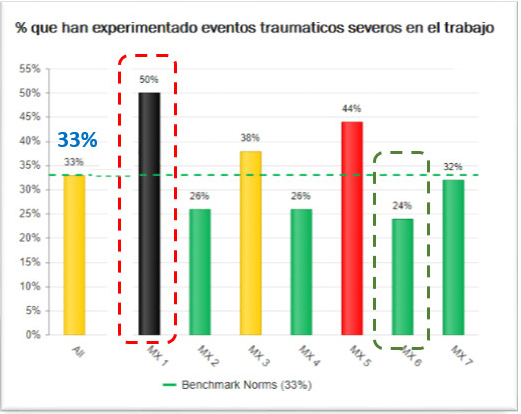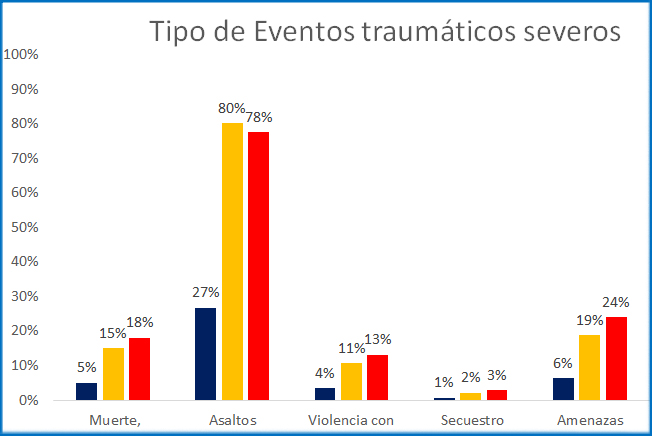A Wellness Checkpoint® Case Study
Y1 NOM-035 data confirms severe traumatic events in the Mexican workplace are much more prevalent than expected
Background
The past decade has seen a global trend towards increasing employer responsibility for providing psychologically safe workplaces for their employees. Continuing this trend, late in 2018 the Mexican Ministry of Labor and Social Welfare introduced new requirements (“Norma Oficial Mexicana NOM035-STPS-2018”) for Mexican employers, obligating them to identify, analyze and prevent the psychosocial risk factors present in their worksites, and:
- screen all workers for post traumatic stress to identify
- workers who have experienced severe traumatic events at work and recommend they receive a comprehensive clinical evaluation of the ongoing symptoms they are still experiencing
- put in in place policies, practices and processes to
ensure a physically and psychologically safe workplace
In response to this legislation, InfoTech began offering a NOM-035 service in 2019. Year 1 data on severe traumatic events in the Mexican workplace is troubling.
Key data points:

- Approximately 33% of all employees surveyed report they have experienced a severe traumatic event in the workplace, with many (≈ 10%) reporting 2 or more traumatic events
- Approximately 21% of all employees surveyed continue to experience ongoing effects of trauma suffered at work at a level that meets the legislated threshold requiring a clinical evaluation
- The most common event is assault, reported by:
- 27% of all employees
- 78% of those reporting only one event and 86% of those reporting 2 or more events
- Of employees who reported severe traumatic events, many continue to experience ongoing effects of the trauma in the past month
Not surprisingly, the data is significantly different for different groups of workers. For workers who experienced multiple traumatic events, the ongoing effects of the trauma are even more significant.
Takeaways:
One third of employees in Mexico have experienced severe traumatic events at work. The majority are still reliving the trauma and struggling with ongoing effects that impact their personal and family life and their ability to perform their daily functions at work. These employees require support in dealing with and overcoming the persistent negative affects of their trauma. But many do not get the professional care they need, and most employers are unaware of the scope of the issue and its impact on their business operations.
In fulfilling their obligations under NOM-035, employers can enhance the psychological and physical health, well-being and productivity of their employees with a dual strategy of Intervention and Prevention.
The first step is to ensure that employees who need professional help are evaluated and receive the treatment and support they need to put the trauma behind them. The second is to ensure physical and psychological safety in the workplace, so that employees can feel safe from assaults, threats, life-threatening accidents and violence of any kind.
NOM-035 data provides a blueprint for action to make each workplace physically and psychologically safe.

